Why my 93-year-old gran is learning to fly
- Published
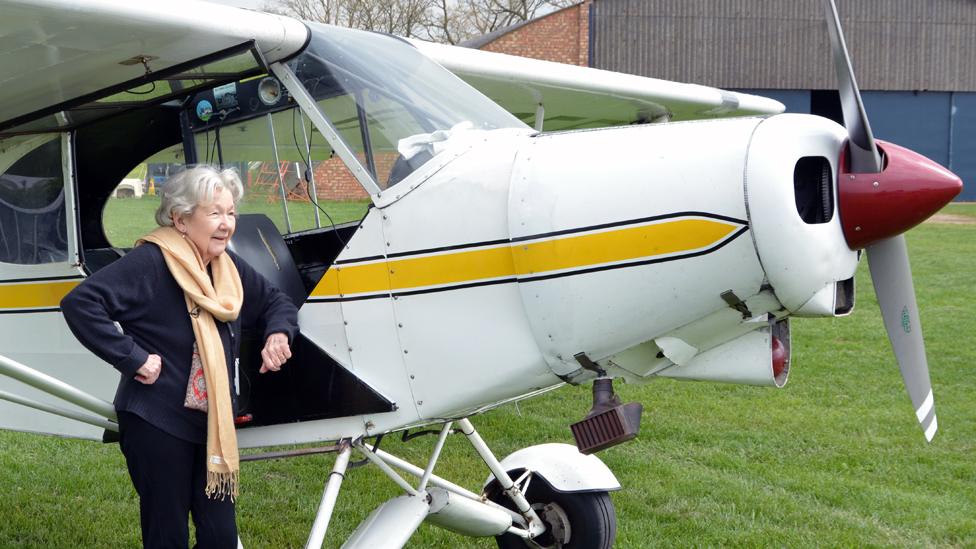
Mollie Macartney's passion for planes began during her wartime service. Now she's taking to the skies herself - and passing on her appetite for adventure to her 12-year-old granddaughter.
On a bright but slightly cloudy day, 93-year-old Mollie is standing on an airfield near London, preparing to start her next flying lesson.
"Ordinary flying is very boring, I hate it - but this, you see so much," she says, "England is so beautiful. I never realised that there were probably 50 shades of green."
It is something she has done on major birthdays since she was 70 and just one facet of her active life (she's a keen horse-rider too).
Joining Mollie at the airfield for the time is her 12-year-old granddaughter Matilda.
"I've heard all about her flying but I've never been here and witnessed it," says Matilda, "I hope she is a better navigator in the plane than when she is driving us here."
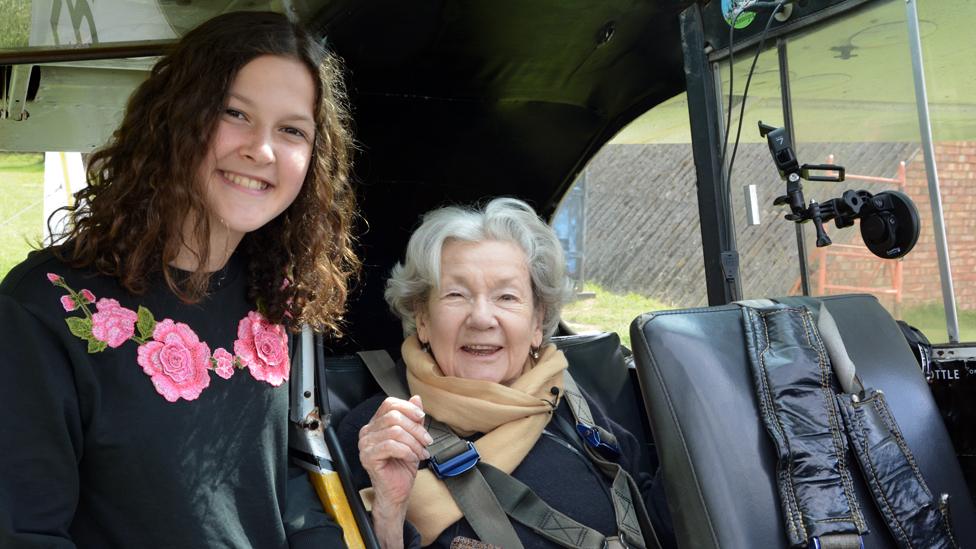
Mollie's passion for flying began in World War Two. She was inspired by the women pilots she saw delivering planes from the factories to the front line.
"When I joined the Wrens [Women's Royal Naval Service] I didn't realise that women could fly," she says.
"I was watching Pathe Gazette and they said this woman was bringing in a Wellington [bomber] and I thought, 'Oh, why did I join the Wrens? I could have done that,' and ever since I thought I must go in an aeroplane and learn to fly."
Aged just 16 when she joined, Mollie admits she forged her birth certificate, knowing the Navy would not take her if she was under 17.
"We all wanted to join up. We weren't going to let anybody come and take us over," she says.
Her job was to look after the electrics and fuel of the ships that took supplies out to the warships.
"Mostly it had to do with bringing troops to ship or taking them off again depending on what they were doing."
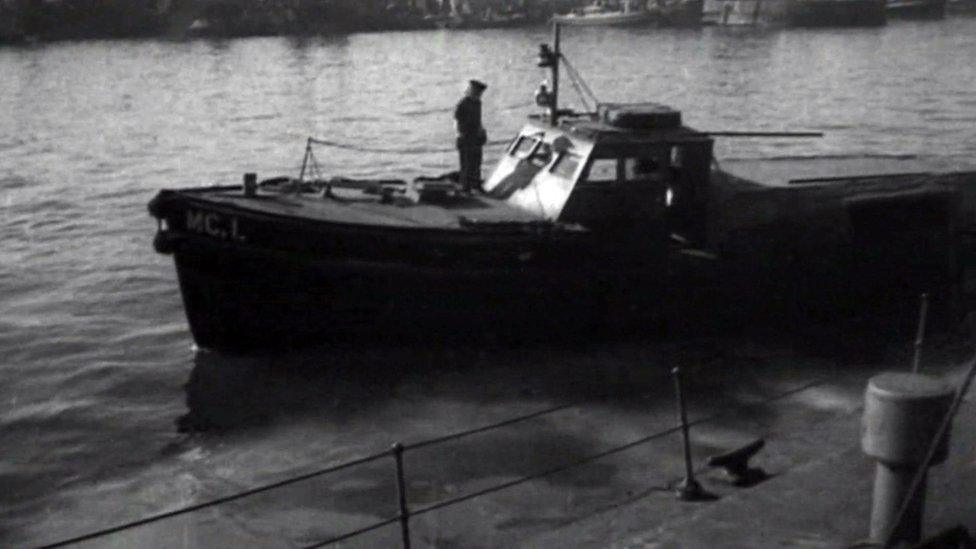
Mollie was based on an MC.2, a boat very similar to an MC.1 (pictured)
But one night proved to be exceptional.
Setting off in a small motorboat with just a navigator for company, she travelled into the English Channel in complete darkness.
Her mission was to deliver a letter to Prime Minister Winston Churchill, who was aboard the HMS King George V (KG5), which was observing radio silence.
"We went out and out and out and because of the blackout you couldn't see the land and you couldn't see anything else because there was no Moon," says Mollie, explaining it was the only time during the war that she really felt frightened.
Eventually they found the battleship. A sailor waiting on a rope ladder took the letter from them as they passed the ship and they were then expected to turn around and return to shore.
"I thought 'Dear God, where the hell are we?' You couldn't see a thing."
During her time in the forces, Mollie saw many disturbing things.
She recalls she and her crew-mates having dinner on-board a destroyer with some of the male sailors who served on it.
"Little did we know it would set sail at about seven o'clock in the morning and by half past eleven it would be back and a lot of them would be dead - all the top bit was gone," says Mollie,
"They had been machine-gunned and torpedoed."
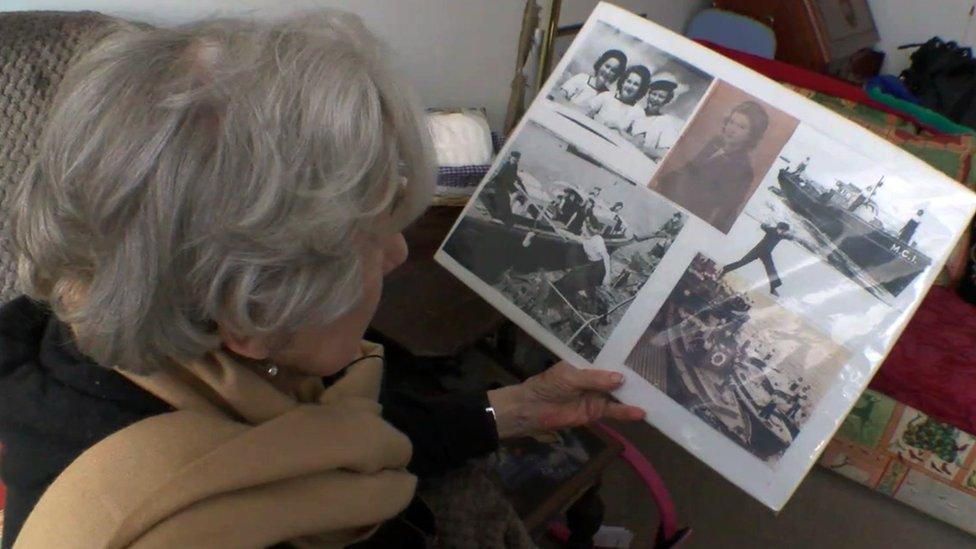
But she also regards her time as a Wren as a privilege and credits the military with teaching her the importance of acceptance and making the best of things.
"If something terrible happened we tried to help and make things better and if we couldn't then that was life. There was nothing we could do.
"I mean literally there was nothing we could do, we had to accept an awful lot," she says.
Like many women who served, Mollie lost her job when the war ended.
"We were chucked out, because sailors were coming back and our job was the most interesting of all jobs and they wanted them back again," says Mollie.
"It was an extraordinary feeling. We had been necessary, we had been doing things, we were needed and suddenly no-one wanted us," she says.
Leaving the Wrens, Mollie went on to become an au pair, a nurse and a chef. But she always had a hankering to take to the skies.
Back on the airfield, Matilda watches her grandmother's plane take off.
"It's piqued my interest and I would like to give it a go," says Matilda, explaining that Mollie's encouragement has helped her make her the person she is now.
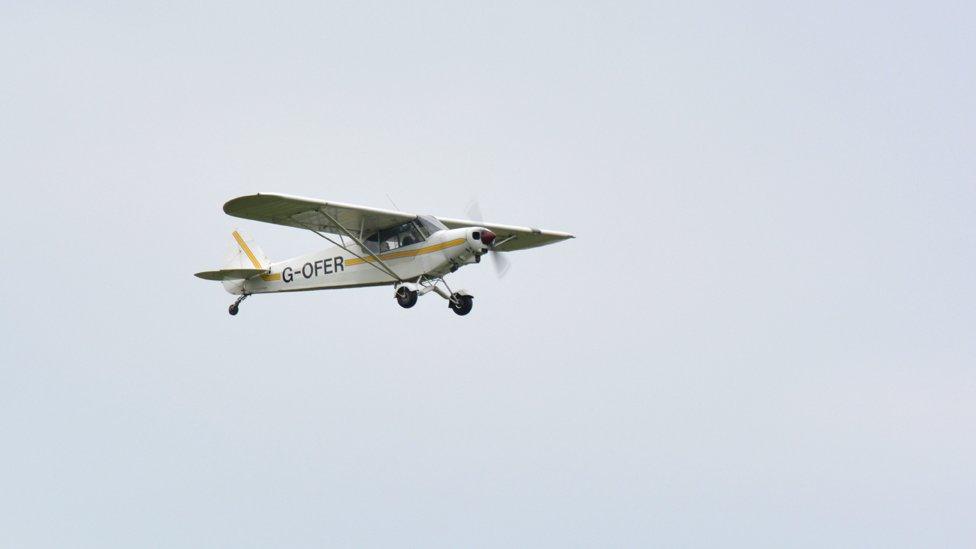
Like her grandmother, Matilda has an appetite for adventure and they share a love of horse riding.
"It's kind of dangerous, so there's an element of that you have to trust the horse," says Matilda.
"You have to work as a team, it's not just an individual thing... you have to really work together to help each other and have a good relationship."
A keen rider, Mollie says she started riding when she was about six or seven years old, but never had formal lessons.
"It was just the natural thing to do," says Mollie.
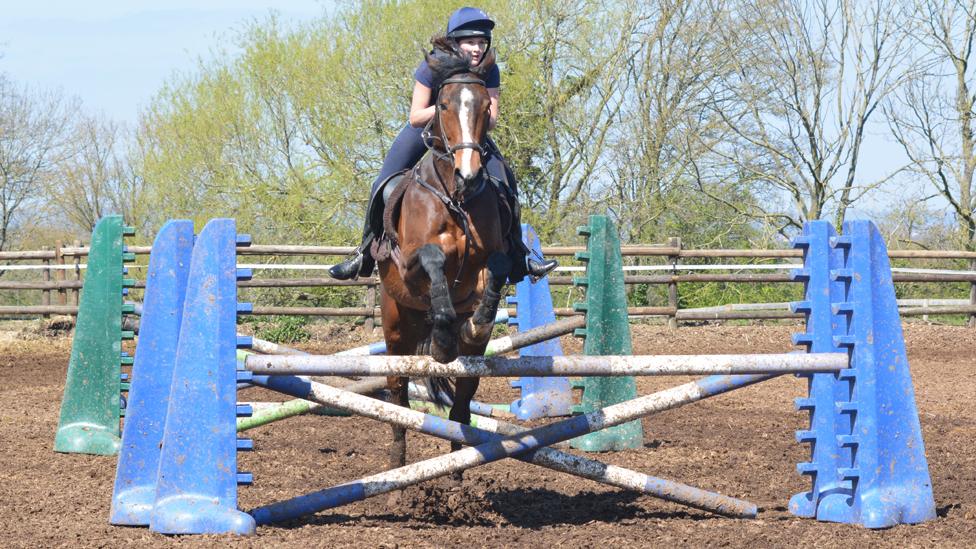
Mollie introduced Matilda to horses when she was 18 months old.
"She took it like a horse to water," says Mollie. She tells Matilda: "You had a smile on your face and you were enjoying it."
Earlier in the week, before the flying lesson, Mollie and Matilda had decided to go for a ride together in the Cotswolds, in the south of England.
A broken hip meant Mollie had to stop temporarily while she recovered and this is the first time she has ridden in about a year.
Climbing carefully on to the horse she leans over and says to it: "Please be respectful to your elders. Otherwise you're in trouble and so am I." She laughs.
As they set off through a village, the Cotswold stone buildings gleaming in the sunlight, Mollie explains it is the sense of freedom and getting back to nature that she loves about riding.
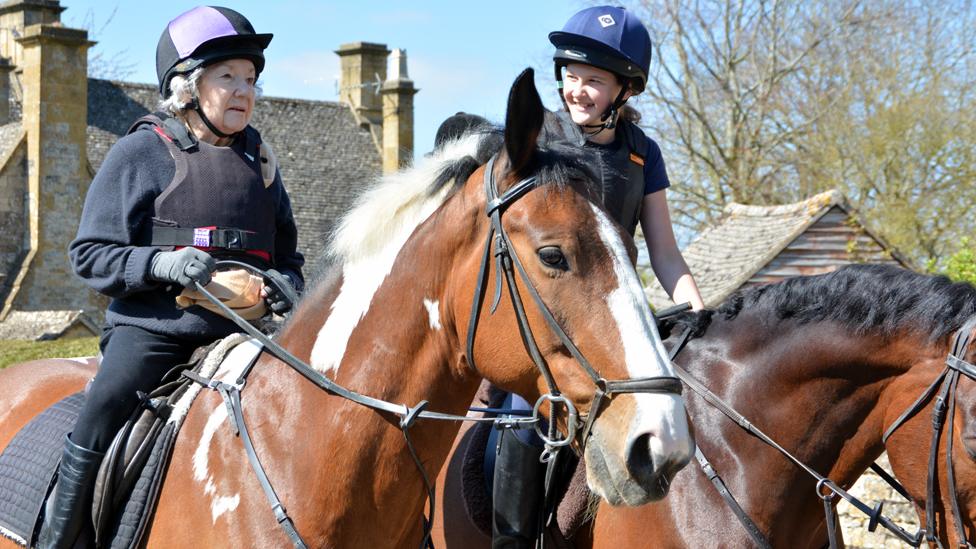
"As I'm going along I'm talking to him and he's listening," she says. "Look at a horse's ears and you will find they are going forward and backwards taking in what's going on."
"I think it's nice to see you doing things and being happy and sharing moments so I can remember what we did together," says Matilda.
Asked what she thinks about people telling her it is dangerous to ride at her age, Mollie says: "Go to hell! I'll do as I please." She laughs again.
But Mollie also says that one of the reasons she is able to stay so active is being able to live in supported accommodation provided by a veteran's charity, Stoll.
"I didn't want to come to Stoll," she says.
"We were living in a very pretty place with a lovely river in front of us and the ducks used to come, they would come right into the flat,"
But one day Mollie had a fall and was on the ground for at least half an hour. She subsequently developed pneumonia and realised that she needed to be somewhere she would be looked after.
Mollie says she does not have any advice to give Matilda, explaining that she believes that whatever she wants to be she will do it well.
But she does offer some general advice for younger people - never turn down opportunities and experiences.
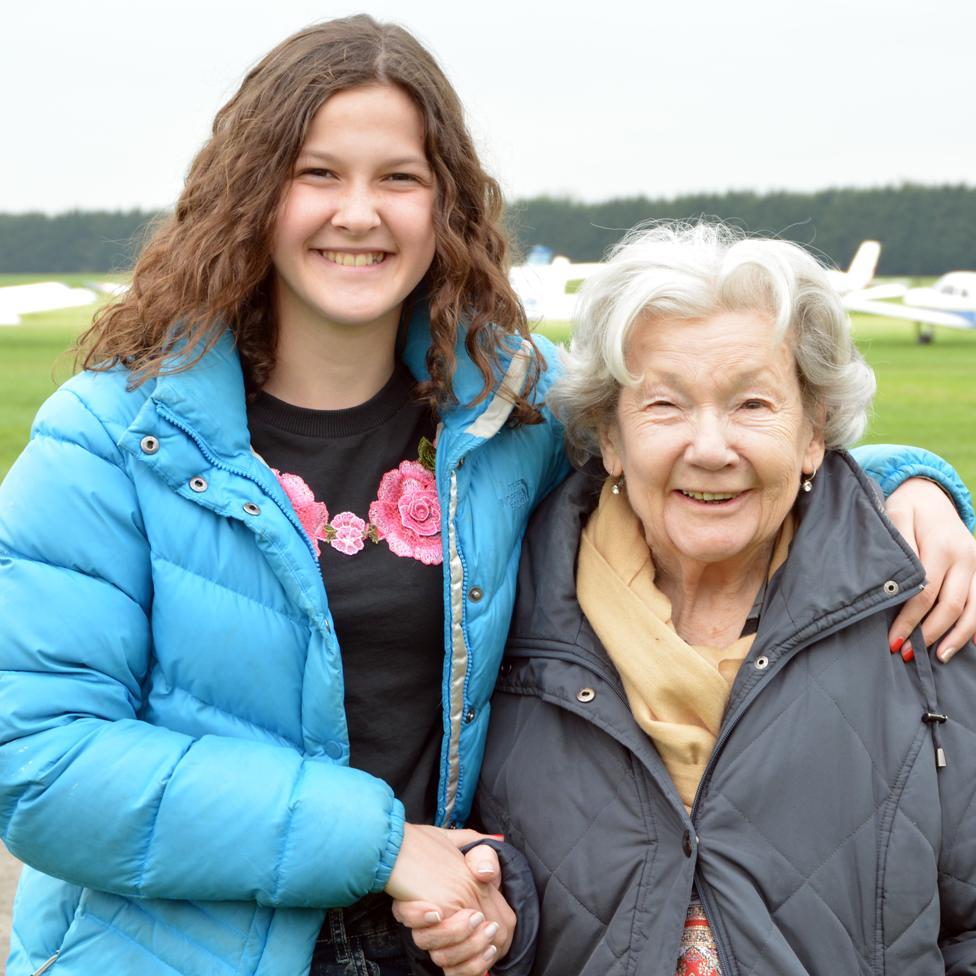
"You would be surprised; all sorts of wonderful things come out of it," she says.
Matilda echoes her grandmother's sentiments.
"Mollie's actions help me remember that I can do anything I want to," says Matilda. Even if she has to lie about her age to do it, she adds, laughing.
"When I am older, I hope I am like grandma and I still ride and fly planes. I need to get it into that, and I hope I am as happy when I am her age, and I can still move around and do things that I want to do."
Additional reporting: Gareth Furby